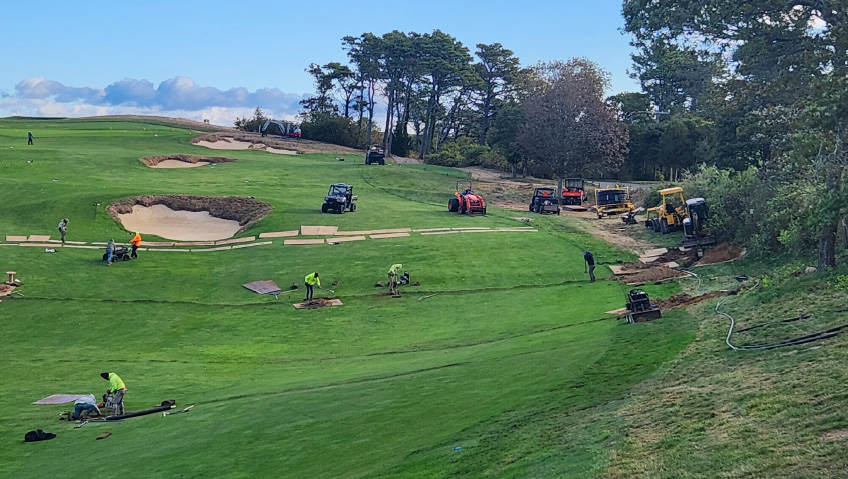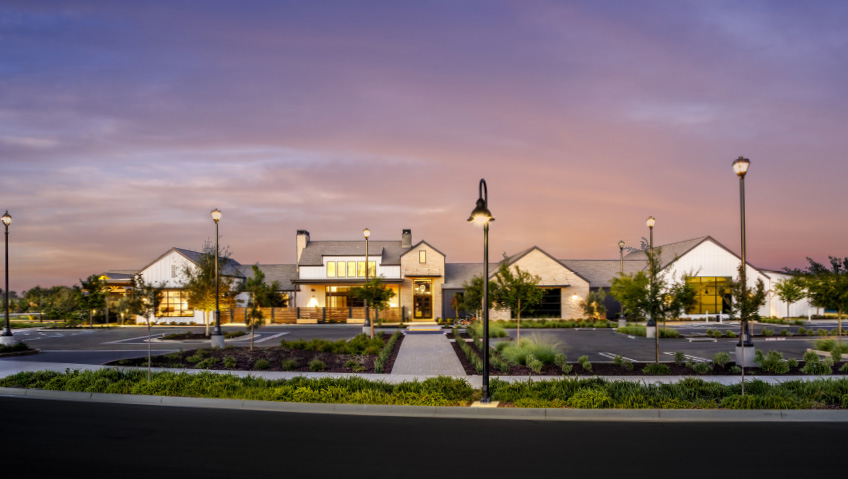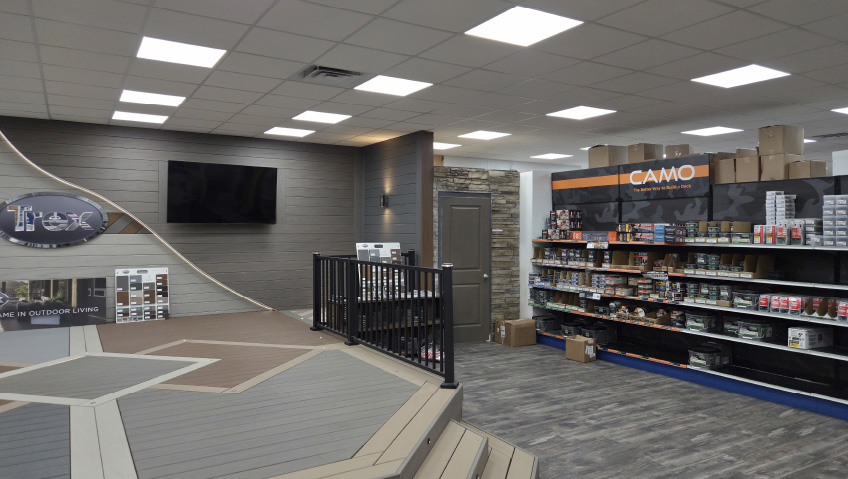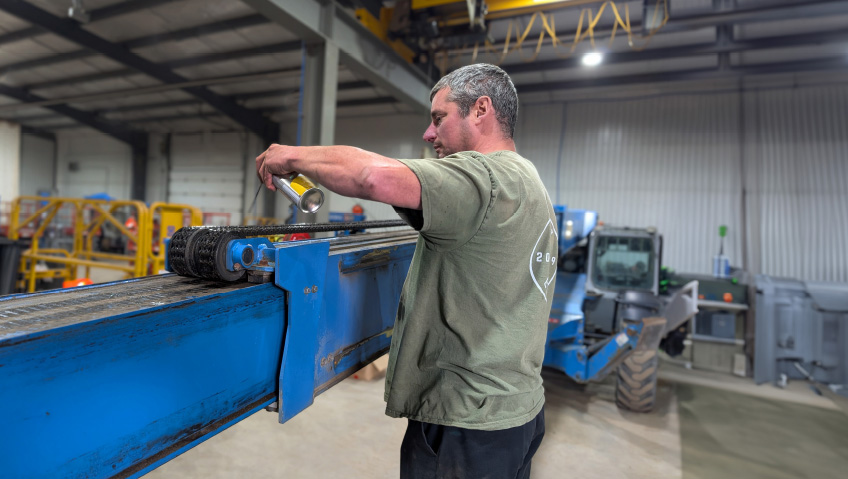Winterberry Gardens got its start 40 years ago, when brothers Scot and Al Leavitt launched a small landscaping company in Connecticut. After profiling the business in 2022, Construction in Focus sat back down with company leadership for this year’s milestone anniversary to learn how the business has achieved its four decades of success.
“It’s a pretty classic landscaping story, where they started out with a beat-up truck and an old trailer and tractor,” CEO Bryan Stolz says of the company’s origins. “And from there, they continued to grow and bring on great team members.”
When Chris Daigle came on board about 25 years ago, “he brought some new expertise and allowed us to expand from just landscaping into irrigation,” Stolz tells us. “And that was really, I think, one of the inflection points for the company and our growth.”
The company grew rapidly with the expanded focus, which allowed the team to relocate the business. “Another inflection point around the same time was us making our move from a garage where it was originally founded, to our current site in Southington, Connecticut, which is a much larger site with a lot of great visibility,” Stolz says. “And that’s allowed us to become a greater part of the community there, as well as in the Farmington Valley where we do a lot of our work. From there, the company continued to grow, continued to add new services.”
None of this was by accident. “That was part of the initial strategy from the three owners where they really wanted to be diverse and offer all the services that a customer could need in one company, instead of them having to contract with all these different providers,” Stolz says. “We were able to give them everything that they might need and that was really important in driving our growth.”
The expansion didn’t stop there. Around 2017, “we really hit another growth point,” he says. “That was driven by the two founding owners who were starting to take a step back. They turned over increasing responsibilities to our leadership team and allowed us to guide the growth… We’ve continued to develop and grow along with the growth of the company. So our personal growth has mirrored the growth of the business itself, and as a result, we’ve more than tripled the size of the company in those nine years.”
This noteworthy growth includes a facility expansion over the last two years, which included both the interior office space and an exterior renovation.
Along with this growth has come some strategic cuts. “We ended up actually getting out of the retail garden center business line,” Stolz explains. “That was one of our areas that was a really important growth driver for us in our early history, but the market has changed in that business area a lot over the last five to ten years. And so it just was taking up a lot of space and wasn’t creating the opportunities for growth that we were getting in other areas.”
The team was nimble enough to identify the issue and respond accordingly, reallocating that retail space for divisions that were more likely to grow. “And every one of our full-time team members who were in the garden center was given an offer in another area of the business,” Stolz says. “That was actually one of the big determining factors when we made that decision; we had a lot of really talented people who weren’t getting their own personal opportunities for growth because they were in an area that just couldn’t grow due to the market conditions. We wanted to make sure that they had the same opportunities as the people in our other areas of the business.”
Golf course irrigation construction is one of these other areas that is showing particularly strong potential. “That’s our fastest growing segment,” Stolz says, and owner and irrigation specialist Chris Daigle remains an active part of this effort on a day-to-day basis. “He’s still very involved and he is one of the main drivers of our golf course irrigation side.”
Earning clients’ trust and respect has been key to the golf course irrigation expansion. “That has grown due to establishing a reputation,” Stolz says. “It took a long time, where it was one course a year. You had to build a certain momentum and a reputation that you could do the work and do it very well within the golf community, because it’s a very tight group of people that are the decision makers. And after a while, we hit sort of another inflection point where we had just hit that critical mass of the right number of courses, the right quality of courses. That has now really blown up for us and been a really great growth driver.”
Winterberry Gardens’ maintenance division is also driving growth, mostly closer to home. “Whereas the golf has a national reputation, the maintenance is much more locally focused,” says Stolz. “And so within our target areas here in Connecticut, we’ve established that reputation of being a great service provider, and also of being able to handle everything that the client could need. So this is where that diversification really comes into play, and it’s really bearing fruit for us now on the maintenance side.”
Company culture, he says, has always been core to Winterberry Gardens’ growth and success. “There are a couple of real keystones to our culture that everything else is based around, and the first one is opportunity. We talk a lot about being opportunistic… It’s opportunistic to go out and pursue growth and pursue new work. That’s a really important part of who we are.”
Being opportunistic also means creating opportunities for team members. “For a lot of landscapers here in Connecticut, unless your name is on the side of the truck, then it’s a job and not a career,” Stolz says. “And that’s something that we purposefully go against.” Leadership works closely with employees to help develop and advance their careers, “and I think that has borne a lot of fruit for us in terms of finding really great, talented people and having them stay with us for the long haul.”
Safety is the other key element of the company culture. “We can’t be asking people to do exceptional work and then not taking care of them and their health and their families.” Slowing down and taking extra care has also led to better quality control. “Whenever you’re rushing, then mistakes are more likely to happen,” Stolz says. “And so [our safety mindset] has been a great thing where it has, most importantly, prevented our people from getting hurt, but it’s also actually increased the quality of the work that we do.”
Winterberry Gardens’ dedicated leadership team has been key to driving growth and the positive company culture. “It’s an incredible group of people,” says Stolz. “And with very few exceptions, our entire management team has pretty much come up through Winterberry. Something that we’re really proud of is that we have all these people who started out at a much lower level and have worked their way up into these career positions, into these positions where they’re recognized—sometimes nationally—for being experts in their field. And that’s what we’re all about—growing people into those types of roles,” he shares.
“As we continue to grow, we are actively looking for more people to step up into those types of positions, both internally and externally. So the feeder system is never ending. Talent acquisition and talent development is something that we’re spending a lot of our time on. We have a lot of success stories of our methods working, and we’re really proud of that.”
After 40 years of successful expansion, it should come as no surprise that the team plans to continue growing the company. “It’s in our DNA, and even if I went out there and told our people to stop growing, I don’t think that we’d be able to,” Stolz says. “It’s just who we are.”






